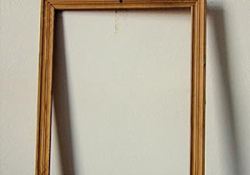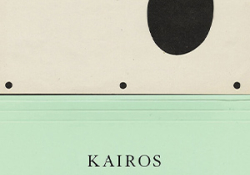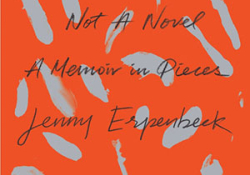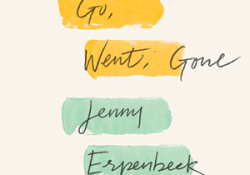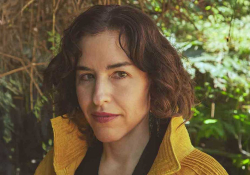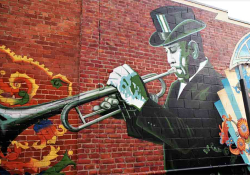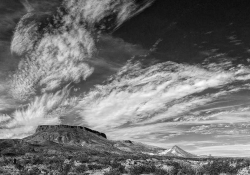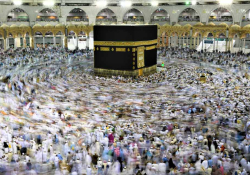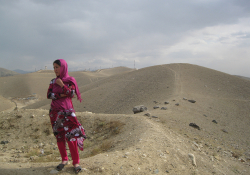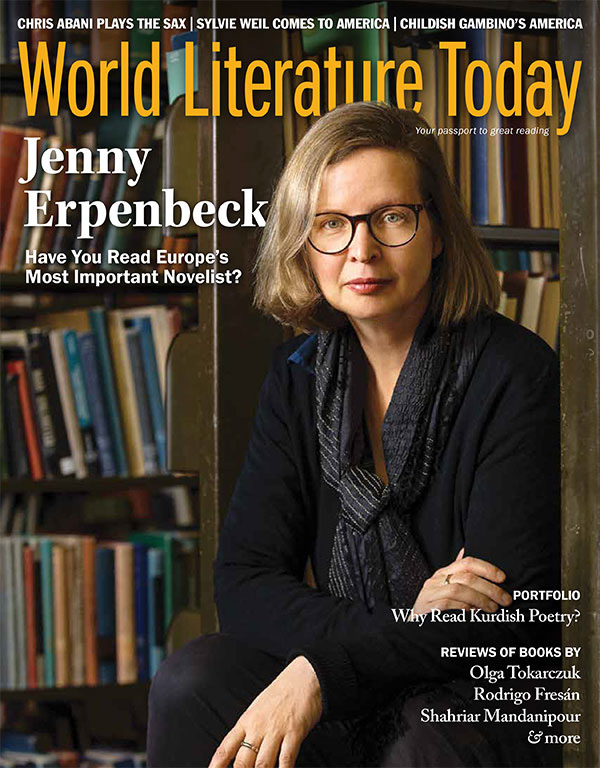Blind Spots: The 2018 Puterbaugh Keynote

After watching the dance adaptation of her story “Sand” at the 2018 Puterbaugh Festival, Erpenbeck delivered the following keynote, in which she invited the hundreds of attendees in the audience to reckon with their own blind spots—we must “step back in order to see,” she writes, “the entire historical tapestry extending far beyond [our] own lifetimes.”
I’m very pleased to speak to you today, particularly since so many fundamental questions that have been hibernating in some blind spot of our consciousness for the past two decades have recently taken on an unaccustomed urgency. Many concepts have suddenly become acute, as it were, and it might be worthwhile to consider their meaning once again from a fresh perspective. One of these concepts, of course, is that of the border—along with the concepts of transition and transgression, in the sense of border crossing. Closely related to these is the concept of freedom.
I was in my early twenties when the Berlin Wall fell and the country where I had grown up disappeared in the course of just a few weeks. Every East German could go to the West to receive 100 “Westmarks,” known as “welcome money,” and six months later the transition to the West German currency marked the official “reunification”—in other words, the end of the German Democratic Republic, nowadays called East Germany, and the expansion of the German Federal Republic. From that moment on, anyone could say whatever he wanted about the former head of state Erich Honecker, or the Stasi head Erich Mielke—or even about the West German chancellor, Helmut Kohl!—and anyone could travel to Paris, Venice, or New York. While people were still celebrating this new “software,” as we might call it today, drastic changes were taking place in the “hardware” as well. A public trust sold a number of East German factories for literally one mark to West German companies, which closed them shortly thereafter. Many workers lost their jobs, and university professors, lecturers, and researchers were also laid off in the East and replaced by university professors, lecturers, and researchers from the West. When the common currency was introduced, rents increased by a factor of ten overnight. West German speculators bought up East German real estate, and state-owned enterprises were privatized. The so-called new federal states were transformed into an enormous market, where all sorts of things could be successfully sold—as we’ve seen, not just bananas. Suddenly everyone was talking about money. Wait, we could talk about money? Shocking.
Ever since then, there has been a border between the two halves of my life: a border made of time, between the first half of my life, which was transformed into history by the fall of the wall and the collapse of the East German state, and the second half, which began at that same moment. Without this experience of transition, from one world to a very other one, I probably never would have started writing. That much is clear to me today. My writing began with reflections on borders, reflections on how we change over the course of our lives, voluntarily or involuntarily, reflections on what identity is, and how much we can lose without losing ourselves.

I HAD KNOWN this border all my life, but when it disappeared in 1989, it went very quickly. Why did it go so quickly? Because we East and West Germans shared a language? Because we, or some of us at least, had families that spanned the East/West divide? “Blood relatives”? Because the works of Goethe and Schiller were taught in schools on both sides of the wall?
Ever since 1989, there has been a border between the two halves of my life: a border made of time. Without this experience of transition, from one world to a very other one, I probably never would have started writing.
Why did people always pronounce the word “freedom” with such enthusiasm, as they continue to do today, whenever they speak of the collapse of East Germany, whereas when people from other countries strive for freedom—from countries like Mali, Niger, Afghanistan, Pakistan, Mexico, Haiti, and other “shitholes,” as Donald Trump recently described them—they’re met with contempt and aversion?
Why do we still see pictures on TV every year on the anniversary of the fall of the wall, showing happy East Germans jubilantly sitting astride the wall—whereas pictures of people scaling the twenty-foot barbed-wire fence that separates the Spanish enclave of Melilla from Morocco only inspire tougher security measures from the European Union?
Why do we still hear laments for the Germans who died attempting to flee over the wall but almost none for the countless refugees who have drowned in the Mediterranean in recent years, turning the sea into a giant grave? Why is it that the opening of the border in 1989 was something wonderful, but today voices cry out for new and stronger borders? What is the difference between these two groups of people who aspire to a new life, to this thing we call “freedom”?
The answer is: nothing.
But there is another answer, too: the difference is the history of these groups and the significance attached to these events.
SEEN FROM THE WEST, the collapse of the Eastern Bloc marked the victorious end of the Cold War, and the fall of the Berlin Wall signified the failure of Communist ideals and utopias. The bankruptcy of any economic system that rejected profit motives could be seen in the parade of Trabis, those iconic East German cars that made their way to West Berlin the night that the wall fell. By contrast, the images of the Spanish enclave of Melilla, the televised images of overcrowded refugee boats, and the designs for the Mexican border wall tell very different stories: stories of postcolonial exodus and of the one-way street of globalization, a system in which European and North American countries, and more recently China, move money around the world, forming alliances with the corrupt elites of other nations to exploit their raw materials, often with the aid of war and violence, while refusing to accept the people who flee from these exploited nations, viewing them as a sort of waste product unwelcome “on our shores.”
True, the Geneva Convention defines the term “refugee,” and the countries that signed this convention agreed to guarantee the right of asylum to political refugees, for example. It’s is a good thing, a very good thing, that Germany fixed this right in its constitution. Nevertheless, the relevant paragraph of the constitution, like all paragraphs of all laws, serves not only to include certain particular “cases” but also to exclude other cases: for instance, the cases of those who are classified as “merely” economic refugees.
Consider, for instance, the young Tuareg man in my most recent novel, Go, Went, Gone: the state-owned French company Areva mines uranium in Niger. In return, it makes payments to the government of Niger, but this money never finds its way to the Tuareg, those disconcertingly defiant nomadic people who have lived traditionally for thousands of years in the region now claimed for mining. The extraction of uranium from the cliffs requires a great deal of water, which causes the water level to drop. Areva has even cut off Tuareg access to some watering holes entirely. Radioactive waste pollutes the ground. This has consequences for the camel herds on which the Tuareg depend for their livelihood; but it has even greater consequences for the Tuareg themselves. The rate of cancer and premature death for people in these regions is strikingly high. The energy produced in French atomic power plants from uranium mined in Niger continues to flow in France and Germany. But where is the freedom for one of these nomads to leave his country and seek his livelihood somewhere else, like France or Germany? Is a person in this situation really an “economic refugee”? Isn’t he a political refugee after all? To say nothing of the destruction of age-old structures by these European corporations, social structures that have governed the lives of these people in their native countries for millenia, to say nothing of the moral and social vacuum that this destruction leaves behind, or of the violence and terror that flourish in this vacuum. To say nothing, even, of the consequences all this will have for future generations: the forced surrender of traditions, the loss of hope, the loss of autonomy, and of control over one’s own existence.
LAST FALL, when I visited Princeton for a reading, I met a professor who proudly mentioned that she had urged one of Angela Merkel’s advisers to accept Syrian refugees. But her advice was not that Germany should accept the refugees instead of rejecting them; rather, it was that if Germany had to accept refugees at all, then at least it should accept Syrian refugees instead of others who were less well educated and sophisticated. And they had to act fast before other countries beat them to the punch. She told Merkel’s adviser that Syrians were elite as far as refugees were concerned; they’d be the easiest to integrate and the quickest to pay back into the system. That way Germany wouldn’t have to accept those poor suckers, you know, the ones from the “shitholes”—like Niger, for example.
In the modern world of passports, quotas, emergency shelters, and exploitative black-market labor, survival is an ongoing, drawn-out process so painful that many people cannot endure it.
We saw the deal that Erdoğan and Merkel negotiated in 2016: for every illegal refugee who was sent back from Greece to Turkey, Germany would accept one legal refugee who was entitled to asylum. But after this deal was made, we saw how Erdoğan kept the educated, upper-class Syrian refugees in Turkey and only sent the old and infirm refugees to Germany. Maybe he’d gotten advice from the same Princeton professor. This distinction between life that is worth something and life that is worth nothing is a distinction that was made under Hitler, too. And it remains a matter of life and death, even if that may not be apparent at first sight. Survival is not just about the moment when someone is pulled from an overcrowded refugee boat, the moment when someone scales a fence. In the modern world of passports, quotas, emergency shelters, and exploitative black-market labor, survival is an ongoing, drawn-out process so painful that many people cannot endure it.
ONE OF THE REFUGEES I spoke with for my last book suffered a mental breakdown after years of wandering around Europe without being allowed to work—a long odyssey that apparently included incidents of violence and abuse. He is now institutionalized in an Italian mental hospital, where he will probably remain forever.
Another, who had been granted temporary papers and a small apartment in Berlin on account of his serious heart problems, suffered a heart attack and died in that same apartment after barely a year. As I write in my most recent book, his father had been killed fifteen years earlier in religious unrest in Nigeria, and his own two small children died in 2011 when the boat that was meant to carry them to safety in Europe capsized. After his death, it was discovered that in spite of his serious illness, he had been housing eight other people in his one-and-a-half room flat, including a family of four with two small children. After years in emergency shelters, he was happy to finally have his own apartment, where he could offer help to friends who didn’t know where else to turn.
When I went to the Muslim funeral home after his death, I learned that Syrian refugees often break down and die in the very moment when their families are allowed to join them—simply because the worry and the psychological strain on refugees in Germany are so great. When this pressure is finally lifted, when the tension begins to loosen, their hold on their own lives loosens as well, with fatal consequences. The funeral home employee then added, without a trace of cynicism, that once the applicant has passed away, of course the family’s immigration authorization is revoked.
While I was serving as volunteer legal guardian for one young refugee, another boy who lived in the same home for underage refugees—a sixteen-year-old Afghan boy—jumped to his death from a fourth-floor window.
A friend of mine has been caring for another teenage boy for two years; the boy recently learned that his mother had died in Afghanistan. Since then, he hardly ever leaves the room; he just lies in bed under the covers and doesn’t go to school. While his classmates learn about mathematical constructs, English grammar, and nineteenth-century art history, this boy asks himself what will happen to his younger brother, whom their mother had been caring for. He asks himself if he failed as a son.
We hear stories like these, from this parallel world, from these blind spots in the happier world we seem to see around us—if only we are willing to look and listen.
But are we willing?
LISTENING IS AN ART—it is a risk—because those blind spots hide our own guilt and impotence. Even things that go wrong in other people’s lives make us begin to fear for our own because it means that misfortune as such has not yet been cast out of our universe, and it may be infectious. What if there are problems that even money can’t solve? We fear what can’t be solved; we fear the gap that yawns between two sentences.
I am not a refugee, but my past also took place in a different country, and it was a stroke of good fortune that the Federal Republic simply issued us new West German passports—something refugees today can only dream of. But if someone like me, a privileged person who reaped the benefits of this transition, insists on speaking not only of benefits, but also of costs, are you willing to listen? If I say that despite all the comforts that I enjoy today, there is still a trace of sadness that cannot be effaced by the gains—how do you respond? Do you ask what that could be? Can you imagine that even in a country that is almost never spoken of without the qualifying phrase “rogue regime,” someone could have had a happy childhood? Or that a number of my friends and I felt, when the reunification came, that history was simply sliding backward instead of moving forward? It is exhausting to think about these things, and to speak about them, just as it is to hear about them—just as it always is when things can’t be easily separated into black and white. A language is more than a code.
Listening is an art—it is a risk—because those blind spots hide our own guilt and impotence.
The German Democratic Republic, as you all know, was that country with the wall, where everyone spied on everyone else, where the factories that had been the property of the East German people for forty years were left in a ramshackle condition, where all the streets were decked out in banners boasting ridiculous slogans. What else is there to say about that miniature Germany? The answer to this question is a deafening silence that grows louder from decade to decade. Is memory an instrument of power? Probably. How far do you have to step back in order to see an entire historical tapestry extending far beyond your own lifetime? How much do you have to know in order to understand what it really is that’s flourishing in your own blind spot?
AS A WRITER, I can take some satisfaction in the fact that I experienced such an upheaval, that I felt what it is like when a system that seems prepared to last for all eternity, through good times and bad, is suddenly wiped out in a matter of weeks. “Things will not stay as they are,” Brecht wrote in a poem, and in that poem his sentence resounded with hope. Of course it can also be understood as a terrifying prophecy. And it seems to me that we only experience its truth when we learn to endure both gains and losses, which are often inseparably intertwined. When the wall fell, many East Germans ran straight into the arms of the new, the unknown. They ran with open arms to greet this new era, not knowing that its arrival would mark them forever as second-class citizens.
I REMEMBER A SCENE that occurred shortly after the fall of the wall, a few weeks before Christmas. In the dark of a December evening, a truck with a West Berlin license plate was parked on a muddy lot near the border crossing. From the tailgate of the truck, a westerner, apparently the owner of a paper store, was handing out Christmas-themed wrapping paper to us East Germans, so that we, the needy people who didn’t have such lovely, shiny wrapping paper, could have a chance to enjoy something pretty for a change. I’m sure that he meant well, he wanted to help.
How far do you have to step back in order to see an entire historical tapestry extending far beyond your own lifetime?
The young woman who hurried past that scene as quickly as she could was in the blind spot of his consciousness. I was twenty-two at the time.
For me, his gesture as he handed down those rolls of paper from the tailgate embodied the whole misery of our inequality; it was a gesture of objective arrogance, so to speak. Most of all, it carried the message: I am above, and you are below. I come from another world, and I will only be here for a little while. This zone is contaminated, I’d rather not even set foot in it. I’m the one who can afford to give gifts. The present time that I live in is beautiful, shiny; it is already the future. Whereas the present time that these people live in, the needy people reaching for the wonderful wrapping paper, is just now turning into a “past present,” that is to say, a past, which might best be left behind in that winter darkness, trampled into the mud. It’s no accident that official usage since 1990 has referred to the “territory of the former German Democratic Republic” or to “former GDR citizens.” Linguists ought to examine whether this designation makes any sense at all.
In retrospect, by the way, it seems particularly telling that the gift handed out by the generous paper seller was wrapping paper. Right after the fall of the wall, I started collecting East German packaging; I hung some samples on the wall of our Berlin apartment. They were made of rough, acidic paper, and they’ve faded so much from the sunlight that you can barely read the print: Good buy—glad buy! Or: That’s where I shop! As if every shopper were a child. You can tell from the packaging that buying and selling didn’t mean much in that country. The gray, gray East. Have you ever imagined Times Square without advertising? We reused our Christmas paper again and again, year after year. We kept our favorite paper in the family; after we exchanged gifts, my mother would fold it up and put it away in a basket, where it would stay until the following year. The practice of writing names on the wrapping paper was frowned upon, as was the use of tape, which might damage the paper when the gifts were unwrapped.
Of course, the nice paper seller who bent down to us from the tailgate couldn’t have known any of that. And he didn’t need to, either, since it wasn’t long before the West German mark was introduced and we started buying that shiny wrapping paper for ourselves. We painted our houses in new, up-to-date colors, the fashion models from the East had their teeth straightened (even though no one had noticed before that they were slightly crooked), and the radio station suddenly decided that my voice was too high to read the book reviews I had written myself and hired someone else to read them instead. All these changes served the same purpose, creating a new image that disguised the realities, giving the former East a face-lift. It was a complex transition to a world where things looked pretty and healthy, sounded good and wholesome, a transition to a world of pleasant aromas and smooth objects that fit comfortably in your hand: in other words, a world of things that were easy to sell, things that people were eager to buy. Whatever was broken, whatever was flawed, was left in the blind spots, in the shadows.

RECENTLY, the minister of education of one of the East German states proposed a student exchange program between eastern and western Germany. The rationale was that the two parts of our country are still so different, so foreign to each other, that something must be done to improve their mutual understanding. A similar rationale could be given for a school exchange in this country between Manhattan and Mississippi, between Boise and Detroit, or just between a public and a private school in the same city.
A three-month exchange in your own country, even in your own city? Why not? Or to put it differently: Why? Why should someone who’s doing just fine want to know what’s happening in the blind spot of his consciousness? When someone with power does something for someone who is powerless, doesn’t everything, even his interest itself, turn into a sort of handout? Is it possible, in the end, to take a vacation from the good fortune of one’s own birth, just for three months? Just as a test, to broaden one’s horizons—and then to quickly retreat into one’s own skin? Or is a visit like that really the only chance that a privileged person has to experience what it is like to live in a world that he doesn’t know and will never really know? And then? Is that an exchange—or tourism? Should we side with the Communists, who say that a well-meaning gift, or in this case the “well-meaning interest,” only shores up the inequality of the system and is thus the opposite of empathy?
Or is it more than a handout when an individual takes it upon himself, for example, to enable another individual to live an independent life? We know the stories of Jewish people who only survived German fascism thanks to the brave decisions of individual helpers who offered them illegal aid. Surely it makes a difference whether a person survives—or not. And not only for that one person but also for the people close to him—friends, parents, and also for his or her children, who may one day come into the world, the grandchildren who may follow.
Shouldn’t we always remember that we are all survivors in historical terms? The offspring of wars, massacres, natural disasters, misery—thanks to countless lucky accidents that saved the lives of our ancestors, thanks to numerous insurrections and revolutions, upheavals and new beginnings, thanks to helping hands like these, one in this century, one in another? How can we slip out of these two roles that world history has assigned us: victim and perpetrator? Or do the roles reverse of their own accord, and then reverse again and again? And if we happen to find ourselves among the better-off for the time being, do we buy an apartment? Where is the line that divides “us” from what is “foreign,” what is “other”? Why is it just as difficult to come to terms with the foreign, with the other, as it is to come to terms without it? How well do you know your kidney? How well do you know your femur? Not well, I hope—but are they foreign to you? For the viruses and bacteria that live inside our bodies, the space within our skin is an entire planet. Orders of magnitude are always important. Also. Or is the real point something else entirely? Who are we, that we may enjoy happiness at the expense of others thanks to a simple matter of selection? How long is the ramp from Auschwitz, anyway—and is it made of time? Perhaps it still hasn’t come to an end? Selection . . .
How can we slip out of these two roles that world history has assigned us: victim and perpetrator?
These are not rhetorical questions. These are questions that I ask myself. This country, for example, which was a place of refuge for the poor and the lost of Europe, still suffers today from the massive violence that was inflicted upon the indigenous Americans and upon the “slaves” imported from Africa. This country wants to show the whole world the happy ending of history, and yet it fails to arrive at an understanding even within its own borders, as we’ve seen day after day for 150 years. But we also see that attempts to repress this problem increasingly end in failure. And this failure expresses itself in violence. Yes, the word “freedom” sounds beautiful. But “equal rights” sounds beautiful as well.
AND YET: can we even afford equal rights? After all, we live on a planet in the middle of an unfathomable cosmos, on this lone planet with its limited resources. “The last war will be fought for the air we breathe,” the wonderful German dramatist Heiner Müller once wrote. Yes, it’s true, the resources are limited. But it’s also true that 90 percent of the world’s wealth is in the hands of 10 percent of the world’s population. Or to say it once again, to put it clearly: 90 percent of the world’s population is forced to share only 10 percent of the world’s wealth. And even within this ridiculous 10 percent there is a hierarchy that drops off sharply. From physics and chemistry we know that gradients tend toward equilibrium. Have we forgotten that victories are always only temporary? Any expansion in the wake of victory is always expansion on the territory of the defeated, and that is always unfamiliar territory. The arrogance of the victor impedes cognition; that is the victor’s greatest weakness, all human consequences aside.
WE ARE NOW several thousand years into the history of education, and yet a professor at an elite university in this country can still imagine no other criterion, no other possible basis for a person’s social acceptance, aside from sheer usefulness. The human being is degraded to a sort of raw material. To be sure, this attitude might resonate in a society structured around the maximization of profit. But human beings, thank God, are not machines that can be turned on and off at will. You and I don’t want to be slaves, but slaves, of course, do not want to be slaves either. The experiences, memories, hopes, traumas, griefs, and joys of all people, including the disregarded and discarded, spread their branches far and wide, across places and times, obeying rules that we barely know. What appears from the perspective of Europe or North America to be nothing but a blind spot is, in fact, an entire world, whether we look at it or not—even if these worlds are hidden behind walls, fences, in far-off camps, or in the bad neighborhood around the corner. A meter-high fence is not a sign of strength but a sign of fear. A sign of the fear of being questioned. Fear of loss, poverty, and death. That is our fear, and it is no different from the fear of the people on the other side of the fence. For we were made from dust, and to dust we shall return. In other words: We, you and I, come from shitholes, too.
University of Oklahoma
March 9, 2018
Translation from the German
By Kurt Beals

